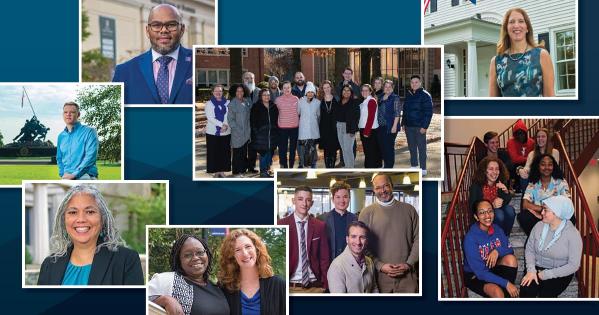Aiming for Racial Equity, AU Continues Push Toward More Equitable Future

As the AU Plan for Inclusive Excellence reaches its third year, AU is placing an even greater emphasis on work to achieve racial equity.
The plan, launched in 2018, included an examination of nearly every aspect of the university—systems, policies, curriculum, resources, hiring, development—and an infusion of diversity, equity and inclusion into strategy and operations. It also contained a foundational ideal: you cannot be excellent across any domain unless you are fully inclusive in all of them.
“In order to build more racially equitable systems within the university, we must prioritize the voices, perspectives, and ideas of those who have borne the brunt of inequities in our society,” said Priya Doshi, SOC Inclusion Officer and a member of the President’s Council on Diversity and Inclusion.
The events of 2020—the high-profile killings of Black Americans such as George Floyd and Breonna Taylor at the hands of police and the ensuing racial justice movement—served to reinforce AU’s existing commitment to IE, the need for change, and the pace of our work.
In July, AU President Sylvia Burwell described how much work we have ahead of us as a nation, and as an AU community, to achieve our racial equity goals. She emphasized the imperative that all AU community members, across racial backgrounds, take action.
“We know our Black students, faculty, and staff and communities of color have shouldered a disproportionate burden in leading the effort for racial equity on campus and beyond,” she said.
Burwell’s message to the AU family included some immediate steps the university would take to address these issues and mentioned the increasing emphasis on racial equity. She also highlighted several ongoing actions and efforts already in progress: establishing a new Office of Equity and Title IX, naming interim leadership for the Antiracist Research and Policy Center, and continuing to build bridges and understanding between campus police and the AU Black community.
“Our vision for racial equity is both focused and inclusive: we believe that by advancing racial equity, we simultaneously build our capacity to address other forms of inequity,” said Amanda Taylor, assistant vice president of diversity, equity, and inclusion.
To continue to move the work forward, the second phase of the inclusive excellence plan lays out more specific and granular actions to address inequity across more offices and more areas of the university.
“I think the important thing is all these conversations are making people be more reflective about what they can do within their own departments, and that's how we're going to get to change,” said Consuelo Grier, the director of multicultural student support at the Center for Diversity and Inclusion. “If you didn't hear the message in the first two years of the IE plan, and it took the events of the summer, at least do something now.”
AU’s senior leadership team is moving forward with building the university-wide culture, climate and policies for this work. This year, the Board of Trustees, the president’s council, and the senior advisory council have undergone training to build racial literacy and skills for equitable decision-making.
By focusing on recruiting and retaining a diverse faculty and staff, the IE team believes it can also help create a sense of belonging for those on campus. In 2020, 50 percent of new tenure-line faculty hired identified as faculty of color, continuing a growth trend for the fourth straight year.
The university is working to identify and correct policies and practices that may present roadblocks to career advancement for faculty of color and women. Beginning next year, the university will launch an effort to support staff retention and equitable career advancement and will lay the foundation for a future pay equity efforts. The university has also increased access to mental health care with diverse providers specializing in racial trauma and healing.
There’s also ongoing work to ensure the curriculum avoids implicit bias by reflecting a diverse range of perspectives, especially from voices that have been historically marginalized. Three schools, CAS, SOE and SPA are piloting antiracist curricular development work. And, this semester, the American University Experience (AUx) program for first year students began intentionally emphasizing antiracist pedagogy and practices, based on feedback from students and instructors from the first two years.
Creating access to education is also a key, Taylor said, particularly for communities such as Washington DC which have been historically marginalized. The university is continuing to support the District Scholars program, which awarded full scholarships to 11 high achieving students from DC public schools. Two of those students are taking part in the Teacher Pipeline Project, allowing them to earn a bachelor’s degree in education at no cost, in exchange for a five-year commitment to teach in DC public schools.
The inclusive excellence effort also includes an audit of those who do business with the university to ensure businesses owned by minorities, women and veterans receive equal consideration in the bidding process.
Just as important as setting these goals, is making sure there’s true progress.
“What is written down in the plan is important. And the results from the plan are crucial,” said Melanie Brown, CAS/BA ’02, an alumna and a member of the PCDI. “But what I hope we accomplish lives in the spaces surrounding the plan and the results — a welcoming place, a healing place, a space for belonging— and have that be what emanates from the plan.”